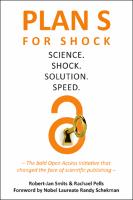Plan S for Shock
Science. Shock. Solution. Speed.
Author(s)
Smits, Robert-Jan
Pells, Rachael
Language
EnglishAbstract
Plan S for shock: the open access initiative that changed the face of global research. This is the story of open access publishing – why it matters now, and for the future. In a world where information has never been so accessible, and answers are available at the touch of a fingertip, we are hungrier for the facts than ever before – something the Covid-19 crisis has brought to light. And yet, paywalls put in place by multi-billion dollar publishing houses are still preventing millions from accessing quality, scientific knowledge – and public trust in science is under threat. On 4 September 2018, a bold new initiative known as ‘Plan S’ was unveiled, kickstarting a world-wide shift in attitudes towards open access research. For the first time, funding agencies across continents joined forces to impose new rules on the publication of research, with the aim of one day making all research free and available to all. What followed was a debate of global proportions, as stakeholders asked: Who has the right to access publicly-funded research? Will it ever be possible to enforce change on a multi-billion dollar market dominated by five major players? Here, the scheme’s founder, Robert-Jan Smits, makes a compelling case for Open Access, and reveals for the first time how he set about turning his controversial plan into reality – as well as some of the challenges faced along the way. In telling his story, Smits argues that the Covid-19 crisis has exposed the traditional academic publishing system as unsustainable.
Keywords
Knowledge; Publishing; Policy; Academia; Science; Open accessDOI
10.5334/bcqISBN
9781914481178, 9781914481185, 9781914481192, 9781914481161, 9781914481178Publisher
Ubiquity PressPublisher website
https://www.ubiquitypress.com/Publication date and place
London, 2022Imprint
Ubiquity PressClassification
History
Political science and theory
Religion and politics
Scientific standards, measurement etc
Sociology
Science: general issues


 Download
Download Web Shop
Web Shop